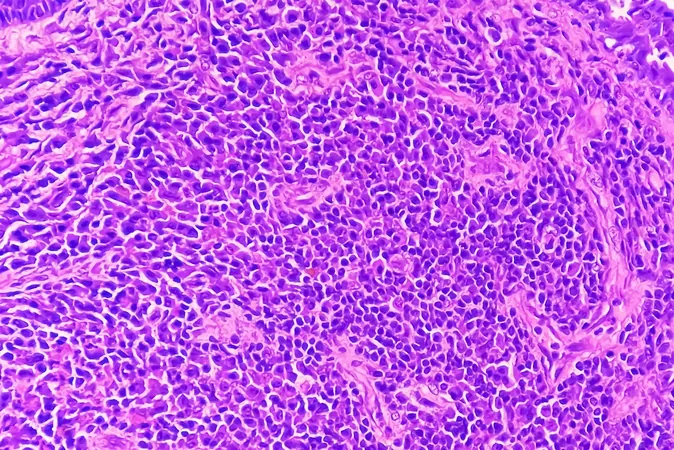
Scientists Uncover New DNA Repair Targets That Could Transform Treatment for Female Reproductive Cancers!
2024-11-15
Author: Jia
Introduction
Every day, our cells endure thousands of DNA-damaging events due to normal cellular processes or environmental exposure. Despite this relentless wear and tear, our cells are equipped with remarkable repair mechanisms that keep our DNA intact over our lifetimes. However, when the delicate balance between DNA damage and repair falters, cancer can emerge.
Groundbreaking Research
A groundbreaking study led by Sarah Hengel, an assistant professor at Tufts University, alongside Kara Bernstein from the University of Pennsylvania School of Medicine, has unveiled new DNA repair proteins as potential therapeutic targets for female reproductive cancers. Their research, recently published in *Nature Communications*, opens a new chapter in the fight against these often-overlooked malignancies.
Current Treatment Limitations
Compared to breast cancer, treatments for endometrial and ovarian cancers have remained limited—often restricted to surgery, with chemotherapy losing effectiveness over time. The grim reality is that many patients face the recurrence of tumors after initial treatments, amplifying the urgency for novel therapeutic strategies.
Expert Insights
"Patients with these cancers often have no effective therapies," Hengel emphasized. "My focus is leveraging my expertise in drug discovery to target specific proteins involved in female reproductive cancers."
Focus on DNA Repair Proteins
The research team is concentrating on two DNA repair proteins, SWSAP1 and SWS1, which together form the Shu complex. Utilizing a state-of-the-art C-trap—a million-dollar instrument that employs laser technology to observe protein interactions with DNA in real-time—Hengel made a surprising discovery about how these proteins function at a molecular level.
Innovative Methodology
This technology allows researchers to replicate mutations found in cancer patients' DNA and track how these mutated proteins operate. "By analyzing the interaction of mutant proteins, we aim to identify which variants respond differently to treatments," she explained. This insight could pave the way for more personalized therapies in the future.
Role of the Shu Complex
What’s particularly compelling is that the Shu complex appears to play a critical secondary role to the well-known BRCA2 protein, which, when mutated, can cause breast and endometrial cancers. The Shu complex acts by transporting essential repair proteins to DNA damage sites and facilitates their activities, complementing BRCA2's function, which clears pathways for efficient repair by removing protective coatings on DNA.
Protein Collaborations
The study highlights critical collaborations among various proteins involved in DNA repair, including RAD51, often referred to as a "molecular matchmaker," which helps align broken DNA strands for effective repair. Another key player, RPA, protects unstable DNA ends to stabilize the repair process.
Vulnerability Across Cancer Types
Although these repair mechanisms are typically robust, they are not foolproof. Environmental toxins accumulate DNA damage over time, contributing to aging and diseases like cancer. Interestingly, defects in the Shu complex have been linked to breast and prostate cancers as well, revealing a pervasive vulnerability across various cancer types.
Targeting Cancer Cells
Cancer cells, notorious for their rapid division, incur damage at a greater rate than healthy cells, rendering them heavily reliant on DNA repair mechanisms. Hengel’s research suggests that tumors with dysfunctional Shu complexes can become especially susceptible to treatments.
Promising Findings
"When we disrupted the Shu complex in cancer cell lines, we discovered they were more sensitive to the chemotherapeutic drug Olaparib, which targets DNA repair processes," Hengel noted. This finding illustrates the potential for the Shu complex to serve as a strategic drug target for cancers exhibiting these defects.
Conclusion
As scientists continue to explore the complex world of DNA repair and its implications for cancer treatment, this research represents a beacon of hope for improving therapy for women struggling with reproductive cancers. With targeted approaches on the horizon, we may be closer than ever to unlocking more effective and personalized treatments for those affected by these devastating diseases.



 Brasil (PT)
Brasil (PT)
 Canada (EN)
Canada (EN)
 Chile (ES)
Chile (ES)
 España (ES)
España (ES)
 France (FR)
France (FR)
 Hong Kong (EN)
Hong Kong (EN)
 Italia (IT)
Italia (IT)
 日本 (JA)
日本 (JA)
 Magyarország (HU)
Magyarország (HU)
 Norge (NO)
Norge (NO)
 Polska (PL)
Polska (PL)
 Schweiz (DE)
Schweiz (DE)
 Singapore (EN)
Singapore (EN)
 Sverige (SV)
Sverige (SV)
 Suomi (FI)
Suomi (FI)
 Türkiye (TR)
Türkiye (TR)